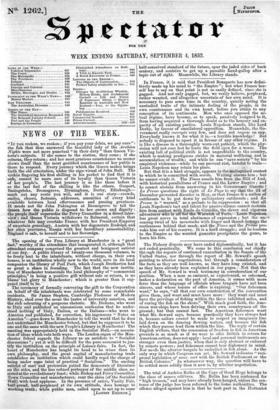The opening of the Free Library at Manchester is a
"great fact," worthy of the attendance that inaugurated it, although that attendant company comprised the greatest and benignest satirist of our day. A public library of twenty-one thousand volumes, to be freely lent to the inhabitants, Without charge, in their own homes, is an institution wholly new to the world, save in its local companion the library of Peel Park, which Joseph Brotherton had so great a share in founding. The fact that the new institu- tion of Manchester transmit& the local philosophy of" commercial principles," in being a positive gift without sale or return, is no blame- but glory to Manchester; which is greater than it sup-
Filed itself, to be. • •
The ceremony of formally conveying the gift to the Corporation on behalf of. the inhabitants was celebrated by some remarkable incidents. Sir James Stephen, Cambridge Professor of Modern 'History, Shed over the scene the lustre of university sanction, and -the rich colouring of a gorgeous rhetoric. Mr. Dickens, who went to Italy and published an uncoil-scions confession that he under- stood nothing of Maly, Italian, or the Italians—who went to America and published, for correction, his ingenuous "Notes on America "—goes down to Manchester to tell the world that he does not understand the Manchester School, but that he supposes it to be one and the same with the new People's Library in Manchester! The meeting was appropriately held in the Socialist' Hall,—an associa- tion of ideas which cuts both ways. The London organ of the Man- chester School regards the Library as an antidote to "Socialist discussions " ; yet it will be difficult for the pure economist to jus- tify the institution on the principle of Laissez-faire. In fact, the heart of Manchester has taught its head to be wiser than its own philosophy, and the great capital of manufacturing trade establishes an institution which could hardly repel the charge of being under some taint of practical " Socialism." The smiling satirist of cant and pretension patted the democrats of literature on the sides, and the less refined portrayer of the middle class as- sisted at the revolutionary feast; while Bishop and Privy Councillor, Town Councillor and manufacturer, rent the skies (of the Socialist -Hall) with loud applause. In the presence of satire, Vanity Fair, -half-proud, half-perplexed at its own attitude, does homage to working truth; while public men, called upon to act up to some
half-conceived standard of the future, spur the jaded sides of hack oratory, and contrive to get up a passable hand-gallop after a topic out of sight. Meanwhile, the Library stands.


























